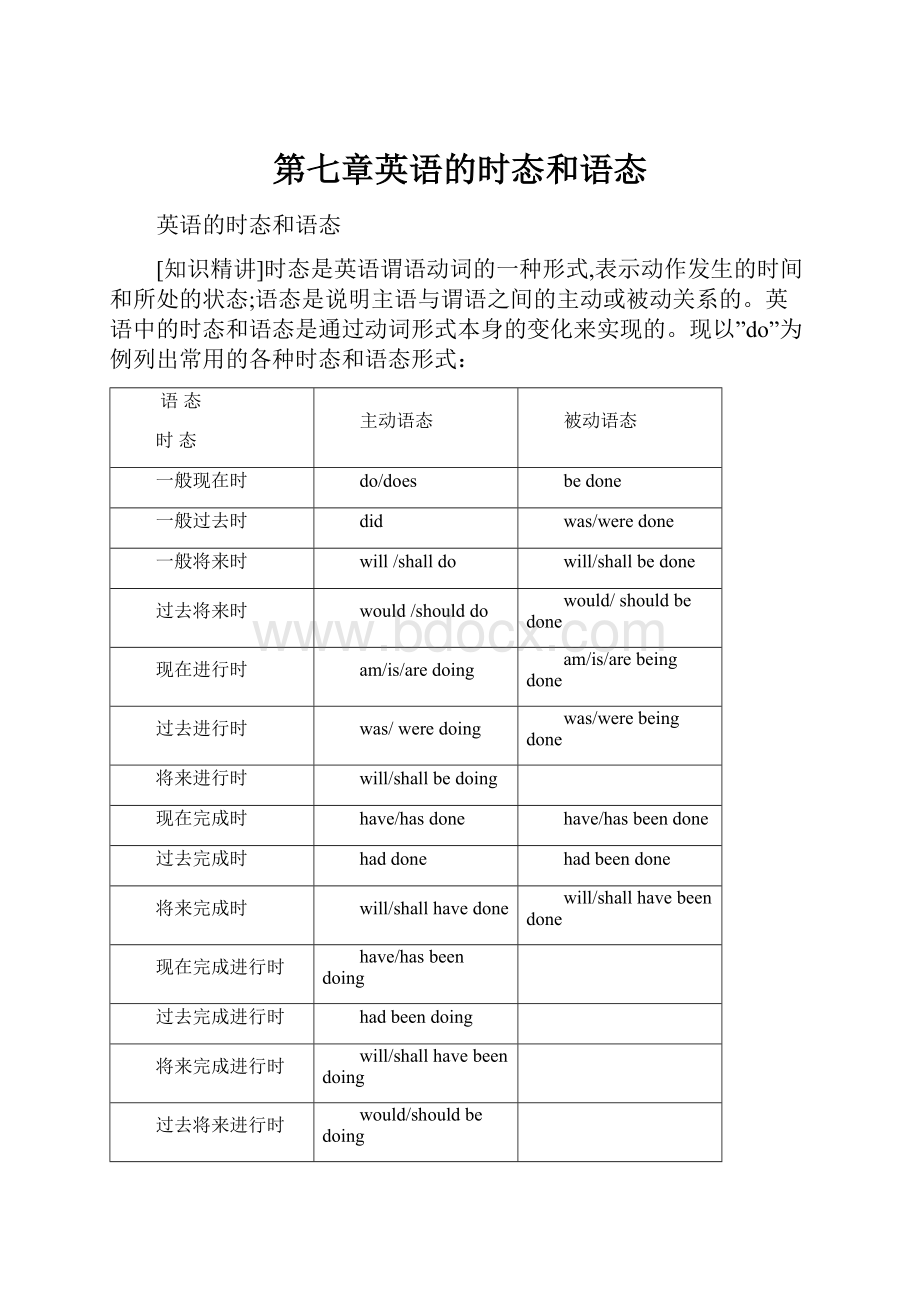第七章英语的时态和语态.docx
《第七章英语的时态和语态.docx》由会员分享,可在线阅读,更多相关《第七章英语的时态和语态.docx(21页珍藏版)》请在冰豆网上搜索。

第七章英语的时态和语态
英语的时态和语态
[知识精讲]时态是英语谓语动词的一种形式,表示动作发生的时间和所处的状态;语态是说明主语与谓语之间的主动或被动关系的。
英语中的时态和语态是通过动词形式本身的变化来实现的。
现以”do”为例列出常用的各种时态和语态形式:
语态
时态
主动语态
被动语态
一般现在时
do/does
bedone
一般过去时
did
was/weredone
一般将来时
will/shalldo
will/shallbedone
过去将来时
would/shoulddo
would/shouldbedone
现在进行时
am/is/aredoing
am/is/arebeingdone
过去进行时
was/weredoing
was/werebeingdone
将来进行时
will/shallbedoing
现在完成时
have/hasdone
have/hasbeendone
过去完成时
haddone
hadbeendone
将来完成时
will/shallhavedone
will/shallhavebeendone
现在完成进行时
have/hasbeendoing
过去完成进行时
hadbeendoing
将来完成进行时
will/shallhavebeendoing
过去将来进行时
would/shouldbedoing
过去将来完成时
would/shouldhavedone
过去将来完成进行时
would/shouldhavebeendoing
一、时态(Tense)
英语时态分为16种:
一般现在、一般过去、一般将来、过去将来时,以及这四者的进行时、完成时和完成进行时。
下面,我们只讲高考中的常用时态。
1.一般现在时
用法:
1).表示经常性、习惯性动作,常与频度副词连用。
例:
Itseldomsnowshere.
若表具体何时发生则选用其他时态。
比较:
Itissnowingheavily./Hasitsnowedherethisyear?
2).表示现阶段发生的动作、情况、状态和特征.常见词有:
see,hear,smell,taste,
feel,notice,agree,believe,like,hate,want,think,belong,seem等。
例:
●Iknowwhatyoumean.
●Smithownsacarandahouse.
●AllthestudentsherebelongtoNo.1MiddleSchool.
3).表示客观事实和普遍真理。
●Thesunrisesintheeast.
●Lighttravelsfasterthansound.
说明
1).表示一个按规定,计划或安排要发生的动作,(仅限于“come,go,leave,arrive,start,end,
continue,return,begin,open”等的动词)一般现在时可与表示将来时间的状语搭配使用,常见的用法是表示飞机,火车,轮船,汽车等的时刻表。
例:
Thenexttrainleavesat3o'clockthisafternoon.
2).在时间和条件状语从句里经常用一般现在(有时也用现在完成时)表示将来事情。
例:
●Ifyoucomethisafternoon,we’llhaveameeting.
●Whenyouhavefinishedthereport,Iwillhavewaitedforabout3hours.
比较:
Idon’tknowwhenhewillcomehere.(宾语从句)
2.一般过去时
用法:
1).表示过去某个时间发生的动作或状态。
●HetravelledinEuropelastyear.
●HewasinBeijingsomeyearsago.
2).表示过去习惯性动作。
特别是由would/usedtodo表达的句型,本身表示的就是过去时。
例:
Theoldmanwouldsitonabenchinthequietparkandlookatothersforhourswithoutdoinganythingortalkingtoanybody.
●Heusedtovisithismotheronceaweek.
说明:
1).一般过去时常带有特定的过去时间状语,如:
yesterday,lastmonth,in1999,twodaysago等,有时还可通过上下文来显示时间概念。
---Howlonghaveyoubeenhere?
---Onlyfiveminutes.TomandPeterwalkedherewithme.
2).一般现在时与一般过去时的区别:
注意动作发生在现在还是过去。
●IforgottotellyouthatIhadpassedtheexam.
●Whatasurprise!
Ididn’tknowyouwerehere.
●Ineverthoughtyouhadgivenupthejob.
●Whydidn’tyou/Ithinkofthat?
●Ididn’tnoticeit.
●Sorry,Ididn’trecognizeyou.
3).常用一般过去时表示主语发出的几个连续动作。
●Themomentshecamein,shetoldmewhathadhappenedtoher.
●Theoldladywentintothesupermarket,boughtsomeeggsandwalkedhome.
3.一般将来时
用法:
1).shall多用于第一人称;在口语中,will可以用于任何人称。
如:
●Ishall/willshowmyphotostoyounextMonday.
●Willyoubeathomeatseventhisevening?
2).begoingto+do,表示将来。
a.计划,安排要发生的事。
例如:
Theplayisgoingtobeproducednextmonth。
说明:
在对话中,听了对方说的话作出的临时反应,用will而不用begoingto。
---Sorry,Iforgottopostyourletter.
---Nevermind.Iwillpostitmyselftonight.
b.有迹象’’可能’’要发生的事。
例如:
Lookatthedarkclouds,thereisgoingtobeastorm.
3).betodo表将来,按计划或正式安排即将发生的事。
例如:
WearetodiscussthereportnextSaturday.
4).beaboutto+do,意为马上要做某事。
例如:
HeisabouttoleaveforBeijing.
注意:
beabouttodo不能与tomorrow,nextweek等表示明确将来时的时间状语连用。
但有beabouttodo….when(这时)…句型,表示“正要…这时…”。
5).beonthepointofdoing同样可以表示“正要,将要”。
例:
Thecoachisonthepointofgivingupthegamebecauseourteamhasbeenscored7points.
6).某些词,如come,go,leave,arrive,start等的一般现在时和现在进行时也可以表示将来。
●Theplanetakesoffat8:
00pm.
●Heisleavingtomorrow.
4.过去将来时
用法:
表示从过去的某个时间看将要发生的事。
例:
IsaidonThursdayIshouldseemyfriendthenextday.
5.现在进行时
用法:
表示此刻或者现阶段正在进行的动作。
●Heiswritingaletternow.
●Chinaisdevelopingthewest.
●Howareyougettingonwithyournewjob?
说明:
1).一般说来,状态动词和短暂动词不能用于各种进行时态,除非有特别的含义。
如:
have,belongto,haveon,look,smell,taste,feel,sound,know,think,believe,remember,forget,love,like,want,hope等。
例如:
●Tom,youarebeingrude.(说明不同于一贯的表现)
●I'mstayingwithmyauntthisweek.(说明暂时的动作)
2).现在进行时与always,constantly,allthetime,forever等副词连用,表示反复发生的动作或持续存在的状态,往往带有说话人的主观色彩(愤怒,不满等情绪)。
例如:
●Youarealwayschangingyourmind.你老是改变主意。
●Mywifeisaskingmeformoneyallthetime.
3).现在进行时可表示渐变,这样的动词有:
get,grow,become,turn,run,go,begin等。
例如:
●Theleavesareturningred.叶子在变红。
●It'sgettingwarmerandwarmer.天越来越热了。
6.过去进行时
用法:
表示在过去某一时刻或者某段时间内正在发生的动作。
例:
●Iwaswashingmyhairwhenyouknockedatthefrontdoor.
●Hewasplayinggamesthistimeyesterday./whenIcamein.
说明:
与一般过去时的区别:
一般过去时只强调某一动作在过去发生,强调结果;过去进行时强调动作在过去某时正在进行或在某一阶段持续,强调动作。
Iwasreadinganovellastnight.(不一定读完)
Ireadanovellastnight.(读完)
—Whydidn'tyoucometothefilmlastnight?
—IwaswatchingafootballgameonTV.
7.将来进行时(willbedoing)
用法:
强调在将来的某个具体时间正在发生的动作或事情。
例:
Don'tworry,youwon'tmissher.ShewillbewearingaredT-shirtandawhiteskirtatthattime.(别担心,你不会认不出她的。
她到时会穿一件红色的T恤衫和一条白色的短裙。
)
8.现在完成时
用法:
1).表示过去开始的动作或者存在的状态延续到现在。
常和sofar,uptonow,recently,already,
just,ever,never,for+时间段,since+时刻点,during/in/overthelast(past)fewyears(months,weeks),inrecentyears状语连用。
●Hehaswritten8booksinthelast3years.
●HehasstudiedEnglishforfiveyears.
●I’vetoldyoumanytimestobecareful.
2).表示过去发生的动作对现在的影响或结果,说话人着眼于现在。
●You’vegrownmuchtaller.(youaretallnow.)
●Ihavecometoapologize.(I’mherenow.)
●Lookwhatyouhavedone.
●IhavebeentoBeijingtwice.
说明:
1.现在完成时的惯用句型
1)Ithasbeen/isthefirst/secondtime....that…结构中的从句部分,用现在完成时。
例如:
●ItisthefirsttimethatIhavevisitedthecity.
●Thisisthefirsttime(that)I'veheardhimsing.
注意:
Itwasthethirdtimethattheboyhadbeenlate.
2)Thisis+形容词最高级+that…结构,that从句要用现在完成时。
例如:
ThisisthebestfilmthatI'veeverseen.这是我看过的最好的电影。
3)havebeento去过某地havegoneto去了某地
2.短暂动词不能与时段连用。
Hehasleftfortwoyears.(×)可改为:
Hehasbeenawayfortwoyears/sincetwoyearsago.
Helefttwoyearsago.
Itistwoyearssinceheleft.
Twoyearshavepassedsinceheleft.
3.现在完成时和一般过去时的区别在于:
现在完成时强调动作持续到现在或是对现在的影响或结果;一般过去时只表示过去的某个时间里发生的动作,与现在没有联系。
试比较:
Hehasbeeninpoorhealthallhislife.(他还活着)
Hewasinpoorhealthallhislife.(他已故)
1).for+时段.表示过去的动作或状态持续到现在,用现在完成时;
表示过去已结束的动作或状态,用一般过去时。
例:
●HelivedinBeijingfortwomonthslastyear.
●Heworkedinthathospitalfor8years.(他曾经在那家医院工作了8年。
这只是讲述一个过去的事实,他现在已经不在那家医院了。
)
●Hehasworkedinthathospitalfor8years.(他已经在那家医院里工作了8年。
表示他从过去开始工作,一直工作到现在,现在仍在那家医院工作。
)
2).since接从句,从句中动词用一般过去时,表动作或状态的结束,主句则用现在完成时。
●10yearshaspassedsincehelefthere..(自从他离开已经过去十年了。
)
●IthasbeenalongtimesinceIenjoyedmyselfsomuch..(我已经很久没这么开心过了。
)
3).如句中有明确表示过去的时间状语,则用一般过去时.例:
●Iheardthestoryforthefirsttimetwoyearsago
●Ihaveheardthestoryafewtimes.
4).谈论已知事情的具体情况,如事情发生的时间、地点、方式等用一般过去时。
●---Haveyouhadlunch?
---Yes,IhaditwithLucyinanewItalianrestaurant.
●Iwonderwhenhegotmarried.
●---That’sanicepicture.Didyouputityourself?
●---Myfatherhasboughtmeabike.
---Really,whendidhebuyit?
9.现在完成进行时(havebeendoing)
用法:
表示某一动作开始于过去某一时间,延续或重复地出现至今,或将继续延续至将来。
而现在完成时,侧重于动作的结束和完成。
例:
●Wehavebeenworkingonthisprojectforoveramonthnow.
●IhavebeenreadingthisbookfortwohoursbutIhaven’tfinishedityet.
●Ihavereadthebook.Ihopeyou’llreadit,too.I’msureyou’llenjoyit.
10.过去完成时(haddone)
用法:
表示在过去的某个时间或动作以前已经发生的动作或已经存在的状态。
表示过去的过去:
----|----------|--------|---->
过去的过去过去现在
1).在过去不同时间发生的两个动作中,发生在先,用过去完成时;发生在后,用一般过去时。
常见时间状语before,by,until,when,after,once,assoonas。
例如:
●Whenthepolicearrived,thethieveshadrunaway.
●Bythetimehewastwelve,Edisonhadbegantomakealivingbyhimself.
2).“时间名词+before”在句子中作状语,谓语动词用过去完成时;“时间名词+ago”在句中作状语,谓语动词用一般过去式。
例如:
●Hesaidhisfirstteacherhaddiedatleast10yearsbefore.
●XiaoHualeftschool3yearsago.
3).表示意向的动词,如hope,wish,expect,think,intend,mean,suppose等,用过去完成时表示"原本…,未能…"。
例如:
●Wehadhopedthatyouwouldcome,butyoudidn't.那时我们希望你能来,但是你没有来。
说明:
.
如果句中没有过去之前的时间状语或另一过去时态的动作,就不能用过去完成时。
例:
●Hehascomebackatlast.Helivedonthatislandalonefor3years.
●Althoughhehadlivedtherefor10years,hecamebacktohishometownlastspring.
11.将来完成时(willhavedone)
用法:
表示在将来某一时间以前已经完成或一直持续的动作。
经常与before+将来时间或by+将来时间连用,也可与before或bythetime引导的现在时的从句连用。
●Theconferencewillhavelastedafullweekbythetimeitends.
●BythetimeyougethomeIwillhavecleanedthehousefromtoptobottom
[真题演练]
1.Thehousebelongstomyauntbutshe____hereanymore.(全国I)
A.hasn’tlivedB.didn’tliveC.hadn’tlivedD.doesn’tlive
【解析】D。
这里说的是现在的事实,所以用一般现在时;本题的干扰项是A项。
2.“Whatareyougoingtodothisafternoon?
”“Iamgoingtothecinemawithsomefriends.Thefilm_________quiteearly,sowe_________tothebookstoreafterthat.”(重庆卷)
A.finished,aregoingB.finished,go
C.finishes,aregoingD.finishes,go
【分析】答案选C。
由问句和答语Iamgoing…可知,要用将来时态,排除选项A和B;电影的开始和结束是电影院在时刻表中已有的计划,用一般现在时表示,而表示最近的打算或安排,则可用现在进行时表示。
3.I____inLondonformanyyears,butI’veneverregrettedmyfinaldecisiontomovebacktoChina.(四川卷)
A.livedB.waslivingC.havelivedD.hadlived
【解析】A。
从句意来看,“我”已经不在伦敦了,所以用一般过去时,但不能用过去完成时,因为句中没有另一过去时态的动作(后分句用的现在完成时)。
4.Scientiststhinkthatthecontinents_________alwayswherethey_________today.(北京卷)
A.aren’t;areB.aren’t;wereC.weren’t;areD.weren’t;were
答案选C。
句意是:
科学家认为各大陆并非一直在它们现在所处的位置。
5.Ihavetogotoworkbytaxibecausemycar____atthegarage.(重庆卷)
A.willberepairedB.isrepairedC.isbeingrepairedD.hasbeenrepaired
【解析】C。
打的上班的原因是车子“在修理”,所以用现在进行时的被动语态。
本题的干扰项是B项,错在不会区别经常性的行为和正在进行的行为。
6.SinceIwonthebigprize,